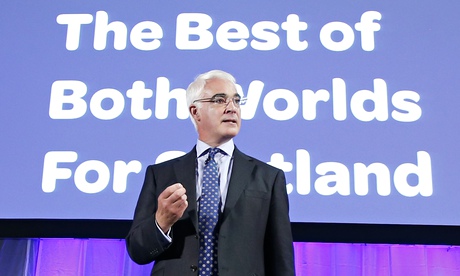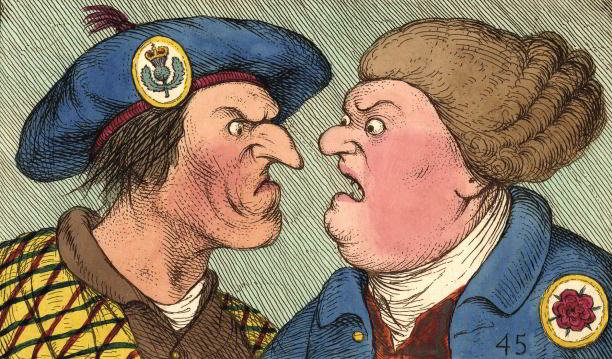On the 28 August 2014, in "The Conversation", Prof Eunice Goes, the Associate Professor of Communications at Richmond American International University (Surrey), published this article:-
As Scotland decides its future, lie back and think of England
For many English people, the forthcoming referendum on Scottish independence is a reminder of England’s Cinderella status in the United Kingdom. While Scotland and Northern Ireland enjoy a large degree of self-government, Wales has significant administrative autonomy (and is in the process of gaining a wide range of new legislative powers), England is entirely governed by Westminster and Whitehall.But this constitutional state of affairs is no longer considered acceptable by many English who feel overlooked by Westminster politicians and short-changed by asymmetrical devolution. In particular, English voters seem to resent the fact that Scottish MPs can vote on matters that affect England whilst Scottish issues are (mostly) decided by the Holyrood parliament.
An opinion poll commissioned by the universities of Edinburgh and Cardiff revealed that 62% of English voters agree that, following a no vote, “Scottish MPs should be prevented from voting on laws that apply only in England”. This hardening of attitudes towards Scotland is hardly shocking but what came as a surprise to many is that 54% of voters supported the idea of an English parliament.
Until now the Westminster elite assumed English voters were not interested in self-government. That was a comforting thought to those who believed that the best answer to the “West Lothian question” was not to ask it.
But in reality the English were never given the chance to taste genuine self-government. Proposals for an English Parliament were never contemplated and for good reasons too. As a representative body of the largest and richest nation of the United Kingdom, an English Parliament would dwarf the devolved bodies of Scotland, Wales and Northern Ireland and would reduce Westminster to political and constitutional irrelevance.
The eight English regional assemblies proposed by the last Labour government in 2003 were an unsatisfactory solution too. Those regional assemblies had so few legislative powers that they were little more than talking shops. So it is not surprising that in 2004 voters from the Northeast of England voted no on the referendum that proposed to create what they saw as an extra layer of politicians and bureaucrats.
The 2004 referendum in the Northeast of England put an end to the debate on English devolution, but maybe it is time to revisit the idea of regional assemblies. The result of the Scottish referendum may make it a necessity. If, as the opinion polls suggest, Scottish voters reject independence, the train is already in place for Westminster to grant further fiscal powers to Holyrood. The three main parties have recently given assurances to Scotland about the scenario of “devo-max”.
And as MPs and peers return to Westminster in the coming weeks they will pen the final amendments to the Wales Bill which will grant more powers, including borrowing and taxation powers, to the Welsh Assembly. These two developments will emphasise the asymmetrical nature of devolution and will foment further English resentment towards the non-English MPs sitting in Westminster.
More importantly, the mood also changed in England. English devolution is no longer a cause defended only by fringe groups such as the English Democrats. This cause is gaining some momentum amongst English (and some Scottish) MPs. More importantly, English voters seem to be open to the idea. As Professor Professor Michael Kenny showed in his book The Politics of English Nationhood, Scottish, Northern Irish and Welsh devolution, rising mistrust towards the European Union, and the sense of economic and cultural insecurity brought by globalisation have contributed to the rise of an English national identity.
In Westminster, the three main political parties have been aware of the changing mood in England but for a variety of reasons – namely electoral considerations and a fear of stirring the wrong type of nationalism – do not know how to respond to it. The parties of the coalition seem to be in two minds about it. Having abolished the English regional development agencies in 2010 the coalition has recently promised a £6bn fund to boost development in the English regions.
The Labour Party seems less confused but it is equally timid. This spring, Labour leader Ed Miliband made proposals for devolution of fiscal powers to English cities. But they are too modest, too technocratic and do not seem to either recognise rising English national identity or to address the constitutional problems created by Scottish and Welsh devolution.
In fairness, these are not easy problems to solve. Having ruled out big bang solutions like an English parliament, piecemeal proposals such as regional representation in the House of Lords or those made by the McKay Commission leave the fundamental problem of the English question unanswered. But this does not mean that there are no other options.
As the Scottish secretary Alistair Carmichael recently suggested there is a “logical conclusion” to this constitutional conundrum. That logical solution is federalism and English regional assemblies. He may well be right.
Click here for the original >>> http://theconversation.com/as-scotland-decides-its-future-lie-back-and-think-of-england-30993
My response to her was:-
Dear Professor Goes,
Re: Your article “As Scotland decides its future, lie back and think of England”
I was interested to read your article and would thank you for your mention of the English Democrats.
The IPPR opinion polls suggest that all our hard work and expense in now distributing over 30 million leaflets and attendance on numerous television and radio interviews is beginning to pay off.
I do however very strongly disagree with your final remarks. Alistair Carmichael’s reported comments would be outrageous for any Scot to call for the dismemberment of England.
His neo-colonialist comments neatly show the very reason why the demand for English Independence is growing. Support for it now being greater than support for the status quo – 19% to 18%. That is a far greater proportion of the population of England than voted for his Party!
Yours sincerely
Robin Tilbrook
Chairman,
The English Democrats
Prof Goes seems to be an internationalist Far-Leftist, if this is to be believed >>> Beeb Bias Craig: WHO'S LEFT OUT? http://beebbiascraig.blogspot.co.uk/2010/05/whos-left-out.html
.... the far-left Portuguese writer Dr Eunice Goes.....The lovely Eunice thought that "the public at large are not too bothered" about (immigration)....Eunice Goes .... wholeheartedly ... sung the praises of mass immigration. Gavin Esler intervened at this point to back up Eunice, saying "I've conducted some public meetings and ordinary members of the public have said precisely that, our health service could not exist without people who are migrants." When Saul raised the point that many people think immigration has been "excessive" and that the UK is a rare example of a country that doesn't know how many immigrants it has, he was leaped on by all and sundry, including.... Eunice (who) had a few angry goes at him too. Ah, the old rallying cry of the Left against the Right: "Shut up!!"
*
Incidentally, for regular viewer of Dateline (if there are any, other than me and Martin at B-BBC!), the role usually provided by French lefty Marc Roche was this week taken by Eunice Goes, who said "most of the Conservative MPs who will come to parliament on May 6th, they are not urbane, metropolitian guys like David Cameron. They are, most..many of them, climate change deniers, homophobes, xenophobes and supporters of the death penalty." Yasmin Alibhai Brown loved it and laughed uproariously. That's the quality of commentator they have on Dateline!












